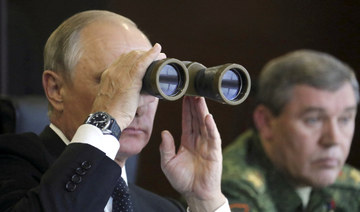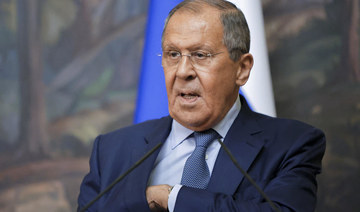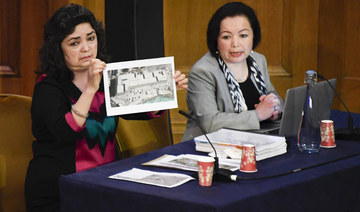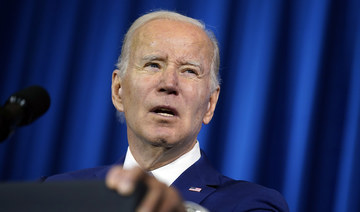BALAKLIIA, Ukraine: Ukraine has set its sights on freeing all territory occupied by invading Russian forces after driving them back in a speedy counter-offensive in the northeast, a goal US President Joe Biden said would be “a long haul” achieving.
In a Tuesday evening address, President Volodymyr Zelensky said around 8,000 square kilometers have been liberated by Ukrainian forces so far this month, apparently all in the northeastern region of Kharkiv.
“Stabilization measures” had been completed in about half of that territory, Zelensky said, “and across a liberated area of about the same size, stabilization measures are still ongoing.”
Reuters was not able to immediately verify the full scope of battlefield successes claimed by Ukraine. The total area cited by Zelensky is roughly the size of the Greek island of Crete.
Asked whether Ukraine has reached a turning point in the six-month war, Biden said it was hard to tell.
HIGHLIGHTS
• Ukraine now on offensive in both south and east
• New US military aid for Ukraine likely, White House says
• In call, Scholz urges Putin to find diplomatic solution soon
“It’s clear the Ukrainians have made significant progress. But I think it’s going to be a long haul.”
The White House, which has provided billions of dollars of weapons and support, said earlier the United States is likely to announce a new military aid package for Ukraine in “coming days.” Russian forces have left defensive positions, particularly in and around Kharkiv, the second largest city in Ukraine, a US spokesperson said.
Since Moscow abandoned its main bastion in the northeast on Saturday, marking its worst defeat since the early days of the war, Ukrainian troops have recaptured dozens of towns in a stunning shift in battleground momentum.
Russian forces still control about a fifth of Ukraine in the south and east, but Kyiv is now on the offensive in both areas.
Ukrainian presidential adviser Oleksiy Arestovych held out the prospects of moving on the eastern province of Luhansk, which together with Donetsk is known as the Donbas, a major industrial region close to the border with Russia.
“There is now an assault on Lyman and there could be an advance on Siversk,” Arestovych said in a video posted on YouTube, referring to two towns. He predicted a fight for the town of Svatovo, where he said the Russians have storage depots.
“And that is what they fear most — that we take Lyman and then advance on Lysychansk and Sievierodonetsk. And they would be cut off from Svatovo,” he said.
Denis Pushilin, leader of the Donetsk People’s Republic run by Russian proxies said in a video post that Lyman remains in their hands. “The situation has been stabilized. The enemy naturally is trying to advance in small groups but (Russian-led) Allied forces are fully repelling them.”
SOLDIERS WELCOMED
Speaking in the central square of Balakliia, a crucial military supply hub taken by Ukrainian forces late last week, Ukraine’s Deputy Defense Minister Hanna Malyar said 150,000 people had been liberated from Russian rule in the area.
Ukrainian flags had been raised and a large crowd gathered to receive bundles of humanitarian aid. A shopping center had been destroyed but many buildings remained intact, with shops closed and boarded up.
“The aim is to liberate the Kharkiv region and beyond — all the territories occupied by the Russian Federation,” Malyar said on the road to Balakliia, which lies 74 km (46 miles) southeast of Kharkiv.
The road to Balakliia through liberated areas was littered with charred vehicles and destroyed military hardware.
Groups of Ukrainian soldiers smoked, grinned and chatted beside the road. One soldier was stretched out on the top of a tank like it was his living room sofa.
In the nearby village of Verbivka, emotional but cheery residents, many of them of retirement age, recounted the fearful existences they led under almost seven months of Russian occupation.
“It was scary: we tried to walk around less, so they’d see us less,” said Tetiana Sinovaz.
Nadia Khvostok, 76, described the traumatic occupation and the arrival of Ukrainian troops, saying residents greeted them “with tears in our eyes.”
There were abandoned Russian vehicles, including a military truck with a smashed windscreen.
POWER LINES RESTORED
Meanwhile, repair crews have restored the two main power lines supplying Kharkiv city and its surrounds, power firm Ukrenergo said after Russian shelling caused blackouts.
The Kyiv government fears Russia will step up attacks on its energy networks as winter approaches and is pleading for anti-aircraft technology from the West to protect the infrastructure.
With Russian forces under pressure, German Chancellor Olaf Scholz had a phone call with Russian President Vladimir Putin on Tuesday.
Scholz called on Putin to find a diplomatic solution as soon as possible, based on a cease-fire, complete withdrawal of Russian troops, and respect for the territorial integrity and sovereignty of Ukraine, a German government spokesperson said.
Kharkiv regional governor Oleh Syehubov, who came to Verbivka, said the authorities were trying to record crimes committed by Russians during their occupation of the area, and recover the bodies of victims.
“We’re asking everyone around about all the places of burial which can be found,” he said.
Moscow denies its forces have committed atrocities in areas they have controlled since Putin ordered the invasion on Feb. 24.




























